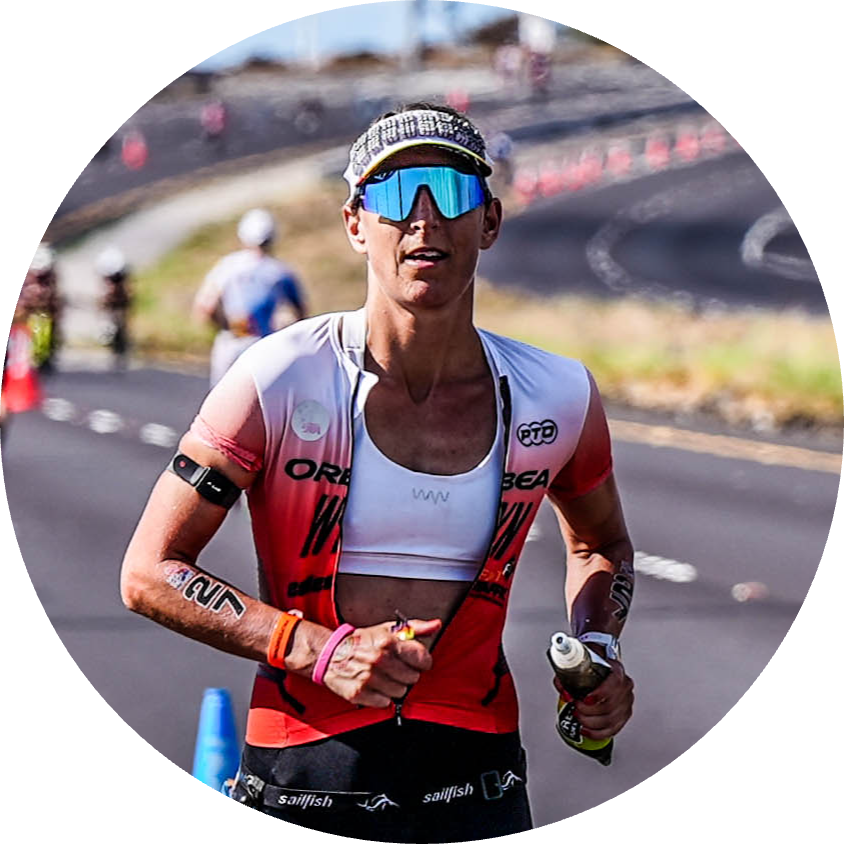
Rebecca Clarke
T100 Singapore
Rebecca's headline numbers
Rebecca's strategy
Fueling
Carbohydrate is the main fuel you burn when racing. Failing to fuel properly is a leading cause of underperformance in longer races.
The later, afternoon start time meant that Becs had to consume more food than she usually would prior to a race. Although she experienced some GI discomfort during the race, she attributes this to the weather conditions, as she was able to eat her normal foods beforehand that didn’t make her feel overly full or uncomfortable. Considering the brutal race intensity, Becs did a great job staying on top of her bike nutrition. She struggled on the run to be as consistent with her intake but still managed to consume a PF 30 Caffeine Gel and some coke throughout to try and keep her energy levels up and fight fatigue.
Hydration
Taking on board an appropriate amount of fluid and sodium is essential to maintaining blood volume and supporting the cardiovascular effort needed to perform on race day.
Whilst the absolute amount of sodium and fluid consumed per hour is important, it’s critical to consider these in relation to each other. This is known as 'relative sodium concentration' and it’s expressed in milligrams per litre (mg/L). How much sodium you’re taking in per litre of fluid is more important than the absolute amount taken in per hour.
Sweat sodium concentration (mg/L) is largely genetically determined and remains relatively stable. Knowing how salty your sweat is enables you to replace a good proportion of your sweat losses, which can range from 200-2,000mg/L.
Whilst Rebecca’s losses are on the low side, getting her hydration strategy right is still crucial when it’s hot and/or humid as her higher sweat rate in these conditions can result in significant net losses over the duration of a race.
Learn moreBecs knew from previous races in the heat that her hydration strategy would need to adapt to replenish her elevated sweat losses, compared to races in cooler conditions. By carrying bottles on the bike with a higher relative sodium concentration than her sweat, Becs helped her body retain as much water as possible. Although she had planned to dilute this slightly with plain water from the aid stations, she unfortunately wasn’t able to pick up as much water as expected on the bike. Combined with her bottles of PH 1000 during the run that she collected at the pro aid stations, her overall average sodium concentration was a little higher than her original target. Prioritising the water pick ups could have helped to alleviate her thirst throughout the race, and brought down the overall ‘saltiness’ of her drinks to more closely match her losses.
Caffeine
Beyond the Three Levers of Performance (carb, sodium and fluid), caffeine is one of only a few substances that is proven to improve performance for most endurance athletes as it can help stave off mental and physical fatigue.
Becs knows the benefits of consuming caffeine before and during races to lower her perceived exertion and fatigue. She supplemented her performance with PF 30 Caffeine Gels on both the bike and run, which kept her in line with the recommended guidelines and equalled a similar amount to her previous middle distance races.
How Rebecca hit her numbers
Here's everything that Rebecca ate and drank on the day...
Rebecca's weapons of choice
Final thoughts
Rebecca's full stats
Data Confidence?
There is an adequate level of accuracy in the data collected and the numbers reported. The athlete manages to recall what they ate and drank including most specifics (brands flavours quantities plausible estimations of volumes). However there are estimations made within the data which affect the overall confidence level in the data reported.